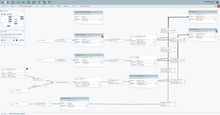Apache NiFi
Program automating data flow between software From Wikipedia, the free encyclopedia
Program automating data flow between software From Wikipedia, the free encyclopedia
Apache NiFi is a software project from the Apache Software Foundation designed to automate the flow of data between software systems. Leveraging the concept of extract, transform, load (ETL), it is based on the "NiagaraFiles" software previously developed by the US National Security Agency (NSA), which is also the source of a part of its present name – NiFi. It was open-sourced as a part of NSA's technology transfer program in 2014.[2][3][4][5][6]
 Apache NiFi Logo | |
 Apache NiFi Web UI | |
| Developer(s) | Apache Software Foundation |
|---|---|
| Initial release | 2006 |
| Stable release | 1.25.0
/ 30 January 2024[1] |
| Repository | github |
| Written in | Java |
| Operating system | Cross-platform |
| Type | Distributed dataflow |
| License | Apache License 2.0 |
| Website | nifi |
The software design is based on the flow-based programming model and offers features which prominently include the ability to operate within clusters, security using TLS encryption, extensibility (users can write their own software to extend its abilities) and improved usability features like a portal which can be used to view and modify behaviour visually.[7]

NiFi is a Java program that runs within a Java virtual machine running on a server.[8] The prominent components of Nifi are:
Seamless Wikipedia browsing. On steroids.
Every time you click a link to Wikipedia, Wiktionary or Wikiquote in your browser's search results, it will show the modern Wikiwand interface.
Wikiwand extension is a five stars, simple, with minimum permission required to keep your browsing private, safe and transparent.